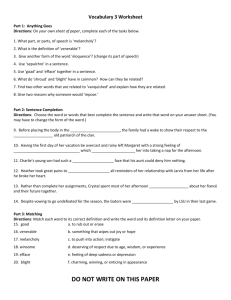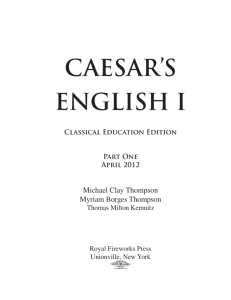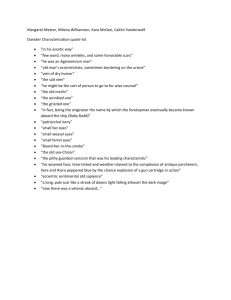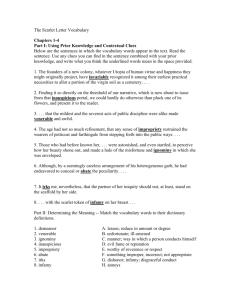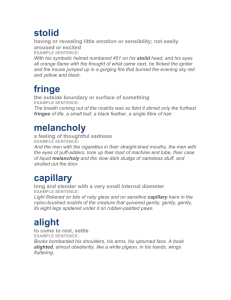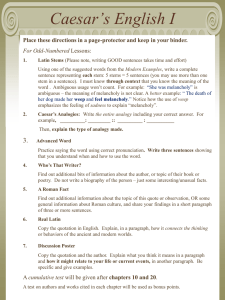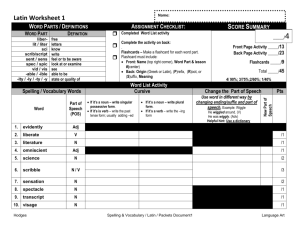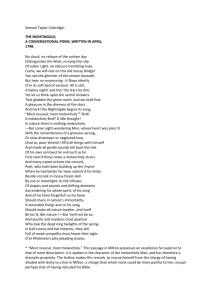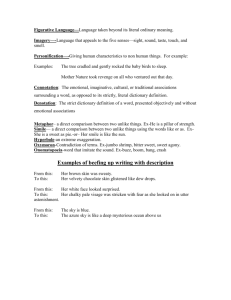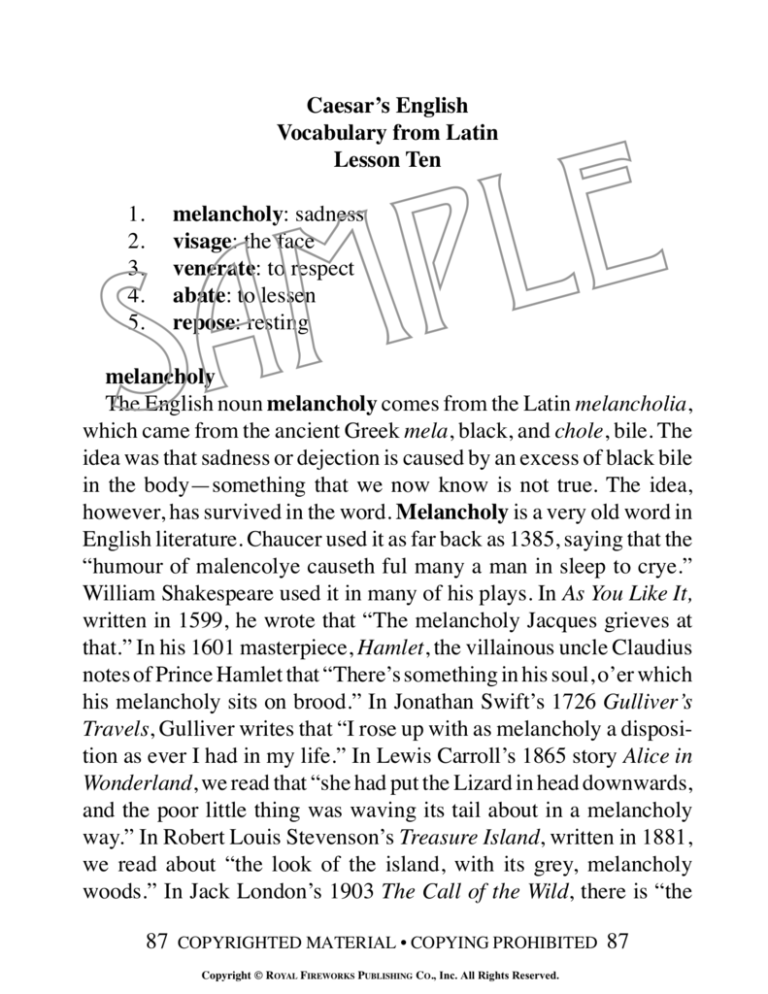
Caesar’s English
Vocabulary from Latin
Lesson Ten
E
L
P
M
A
S
1.
2.
3.
4.
5.
melancholy: sadness
visage: the face
venerate: to respect
abate: to lessen
repose: resting
melancholy
The English noun melancholy comes from the Latin melancholia,
which came from the ancient Greek mela, black, and chole, bile. The
idea was that sadness or dejection is caused by an excess of black bile
in the body—something that we now know is not true. The idea,
however, has survived in the word. Melancholy is a very old word in
English literature. Chaucer used it as far back as 1385, saying that the
“humour of malencolye causeth ful many a man in sleep to crye.”
William Shakespeare used it in many of his plays. In As You Like It,
written in 1599, he wrote that “The melancholy Jacques grieves at
that.” In his 1601 masterpiece, Hamlet, the villainous uncle Claudius
notes of Prince Hamlet that “There’s something in his soul, o’er which
his melancholy sits on brood.” In Jonathan Swift’s 1726 Gulliver’s
Travels, Gulliver writes that “I rose up with as melancholy a disposition as ever I had in my life.” In Lewis Carroll’s 1865 story Alice in
Wonderland, we read that “she had put the Lizard in head downwards,
and the poor little thing was waving its tail about in a melancholy
way.” In Robert Louis Stevenson’s Treasure Island, written in 1881,
we read about “the look of the island, with its grey, melancholy
woods.” In Jack London’s 1903 The Call of the Wild, there is “the
87
COPYRIGHTED MATERIAL • COPYING PROHIBITED
Copyright © ROYAL FIREWORKS PUBLISHING CO., Inc. All Rights Reserved.
87
melancholy rippling of waves on lonely beaches.” We can see from
these famous uses of the word that melancholy can describe a person’s
feelings, but it can also describe things in the environment that seem
sad, or that make us feel sad. One of the most striking melancholy
sentences comes from 1904, from James M. Barrie’s great Peter Pan:
“His eyes were of the blue of the forget-me-not, and of a profound
melancholy.”
E
L
P
M
A
S
visage
The English noun visage is a synonym of our friend countenance.
Perhaps there is a difference in emphasis in the words, with countenance focusing on the contents of the expression and visage emphasizing the look of the face; after all, visage traces back to the Latin
videre, to see. Even so, the two words both refer to the appearance of
the face, and countenance is often used to define visage. We see from
literature that the visage can be pale, comely, plump, or doleful. It can
be domineering or stern. Chaucer described a “sad visage,” and
Shakespeare wrote a wonderful description of a mask in Romeo and
Juliet: “Give me a case” he wrote, “to put my visage in.” In Paradise
Lost, the greatest epic poem in the English language, John Milton
wrote of “Celestial visages,” a “visage all inflamed,” and a “visage
incompos’d.” In Sir Walter Scott’s knight novel, Ivanhoe, we read of
the “scars with which is visage was seamed.” And in Mary Shelley’s
Frankenstein, the poor monster explains that “I travelled only at night,
fearful of encountering the visage of a human being.” In James
Fennimore Cooper’s The Last of the Mohicans, we encounter “the
scowling visage of Chingachgook.” One of the greatest visage sentences comes from the great English novelist Charles Dickens, who in
A Tale of Two Cities described someone’s “taciturn and ironbound
visage.” Taciturn means silent, and so this character’s visage is frozen
and metallic—not very pleasant!
88
COPYRIGHTED MATERIAL • COPYING PROHIBITED
Copyright © ROYAL FIREWORKS PUBLISHING CO., Inc. All Rights Reserved.
88
venerate
To venerate is to respect or revere, to admire. The word traces all
the way back to the Roman’s word venus, love. Veneration is a kind
of high, respectful love. The adjective form of the word is venerable.
It is important for many words to see that they are available in different
part of speech: venerate is a verb, veneration is a noun, venerable
is an adjective. Being able to change forms like this gives a word great
power in our sentences. What kinds of things can we venerate? What
things can be venerable? In British and American literature, there are
venerable white beards, venerable towns, venerable bows of ships,
and venerable friends. We often use venerable to describe what is
religious; there are venerable ministers, venerable pastors, and venerable chapels. In Walden, Henry David Thoreau wrote of a “venerable
moss-grown and hoary ruin.” In Song of Myself, part of his great
Leaves of Grass, Walt Whitman asked, “Why should I venerate and be
ceremonious?” Sometimes veneration is very sincere; In Uncle Tom’s
Cabin, Harriet Beecher Stowe described a character who was “gazing
upward with a face fervent with veneration.” The word fervent means
that the face was very intense, very sincere. In Sir Walter Scott’s
Ivanhoe, we also see this kind of earnest veneration; another character
had extended “his hand to Gurth, who kissed it with the utmost
possible veneration.” In Gulliver’s Travels, Jonathan Swift had his
main character Gulliver admit that “I have too great a veneration for
crowned heads.” In Charlotte Brontë’s great novel Jane Eyre, Jane
confesses that “I deeply venerated my cousin’s talent and principle.”
E
L
P
M
A
S
abate
Our English verb abate means to lessen in amount or degree, but
it comes from the Old French abattre, to beat down! This, in turn,
came from the Latin batuere, to beat. Writers have used abate to
89
COPYRIGHTED MATERIAL • COPYING PROHIBITED
Copyright © ROYAL FIREWORKS PUBLISHING CO., Inc. All Rights Reserved.
89
describe how things go down, reduce, or recede. Note that in order for
something to get smaller, it must first be bigger, and so abate is what
big things do. Big storms abate. Big emotions abate. In Bram Stoker’s
Dracula we read, “When the snow storm abated we looked again.” In
Kingston’s translation of Wyss’s The Swiss Family Robinson, we read
that “Toward evening the universal excitement began to abate, and the
party assembled for supper with tolerable composure.” In Robert
Louis Stevenson’s Kidnapped, we read that “my strength had much
abated.” In Scott’s Ivanhoe, we are relieved to learn that “His fever is
abated.” Mary Shelley, in Frankenstein, wrote that “I continued with
unabated fervour to traverse immense deserts.” This is a great sentence for us to study because it contains not only the negative of abate,
but it also contains traverse, another word in this lesson. Traverse
means cross, and so traversing a desert is crossing it. In Shakespeare’s
great tragedy, King Lear, the pitiful old king complains that his
daughter has gotten rid of his train, his group of servants: “She hath
abated me of half my train,” he cries.
E
L
P
M
A
S
repose
The English word repose traces all the way back to the Latin pausa,
to pause. When we re-pose, we pause again. When we use repose as
a verb, it means the act of resting, and when we use repose as a noun,
it refers to the rest. In Shakespeare’s 1611 play The Tempest, a
character sleepwalks: “This is a strange repose, to be asleep with eyes
wide open—standing, speaking, moving, and yet so fast asleep.” Two
hundred hears after Shakespeare, Mary Shelley used repose in
Frankenstein, to paint a picture of tranquility: “All nature reposed
under the eye of the quiet moon.” In The Legend of Sleepy Hollow,
Washington Irving wrote that “A small brook glides through it, with
just murmur enough to lull one to repose.” An interesting use comes
from Sir Walter Scott in Ivanhoe, where the knights take the trouble
90
COPYRIGHTED MATERIAL • COPYING PROHIBITED
Copyright © ROYAL FIREWORKS PUBLISHING CO., Inc. All Rights Reserved.
90
“to repose their horses.” Robert Louis Stevenson used repose in Dr.
Jekyll and Mr. Hyde, to describe the repose of an inanimate (mindless)
object: “He locked the note into his safe, where it reposed from that
time forward.” In Frances Hodgson Burnett’s The Secret Garden there
is “a new reposeful sleep.” In Kenneth Grahame’s The Wind in the
Willows there is a “well-earned repose.” And in George Orwell’s
Animal Farm “Napoleon reposed on a bed of straw.” Napoleon, being
a pig, needed his repose.
E
L
P
M
A
S
What Is This Writer Saying?
Discuss the meaning of the bold word in each of the following
sentences:
From Joseph Conrad’s Heart of Darkness: “A heap of rubbish
reposed in a dark corner.”
From William Shakespeare’s A Midsummer Night’s Dream: “O
long and tedious night, abate thy hours!”
From Harper Lee’s To Kill a Mockingbird: “The Maycomb jail
was the most venerable of the county’s buildings.”
From Robert Penn Warren’s All the King’s Men: “Mr. Patton’s
granite visage seemed to lean toward me like a monument about
to fall.”
From William Shakespeare’s Hamlet: “There’s something in his
soul, o’er which his melancholy sits on brood.”
91
COPYRIGHTED MATERIAL • COPYING PROHIBITED
Copyright © ROYAL FIREWORKS PUBLISHING CO., Inc. All Rights Reserved.
91
Caesar’s English
Word Poster
E
L
abate
P
M
A
S
lessen
O long and
tedious night,
abate thy hours.
-William Shakespeare
A Midsummer Night’s Dream
92
COPYRIGHTED MATERIAL • COPYING PROHIBITED
Copyright © ROYAL FIREWORKS PUBLISHING CO., Inc. All Rights Reserved.
92
Caesar’s Synonyms
Here are words that are similar to the words in our list, but are they
exactly the same in meaning? Or are they slightly different? For each
word on our list, look up any synonym that you do not know, then pick
one, and carefully explain the difference between it and our word.
melancholy: glumness, sadness, dejection, gloominess, woe, desolation, unhappiness, depression, despair
visage: expression, countenance, mien, air, physiognomy, aspect,
look, mug, lineament, features
venerate: respect, honor, cherish, esteem, treasure, admire, prize,
look up to, value, reverence, appreciate, revere, regard
abate: fade, flag, subsude, mellow, ease, slacken, ebb, dwindle,
recede, relent, taper, moderate, die down, wane, relent, fall, lapse
repose: rest, peace, respite, quiet, placidity, calmness, relaxation,
lull, serenity, ease, stillness, breathing-space
E
L
P
M
A
S
Real Latin
From Horace:
Puella eximia forma.
A girl of exceptional beauty.
Caesar’s Spanish
Everywhere we turn, language reveals to us that modern English
and modern Spanish are both descendants of ancient Latin:
Latin
melancholia
venus
reponere
93
Spanish
melancolía
venerar
reposo
English
melancholy
venerate
repose
COPYRIGHTED MATERIAL • COPYING PROHIBITED
Copyright © ROYAL FIREWORKS PUBLISHING CO., Inc. All Rights Reserved.
93
Caesar’s Rewrites
Here are some sentences from famous books. In each case, rewrite
the sentence into more ordinary words. Example from Marjorie
Rawlings’s The Yearling: “A languor crept over him.” The rewrite:
Little by little, he began to feel lazy.
E
L
P
M
A
S
From Jack London’s The Call of the Wild: “His mane, in repose
as it was, half bristled.”
From Harper Lee’s To Kill A Mockingbird: “The Maycomb jail
was the most venerable of the county’s buildings.”
From Rouse’s translation of The Odyssey of Homer: “How can
we persuade Poseidon to abate his anger?”
From James M. Barrie’s Peter Pan: “This ill-luck had given a
gentle melancholy to his countenance.”
From Frederick Douglass’s Narrative: “The right of the grimvisaged pirate upon the high seas is exactly the same.”
Who’s That Writer?
Jonathan Swift wrote Gulliver’s Travels, one of the world’s most
popular books for children and adults alike. Born in 1667 in Dublin,
Ireland, Swift attended college at Trinity College, Dublin. In his early
writing, he ridiculed shallow thinkers and supported the merits of the
ancient classics. Gulliver’s Travels, published anonymously in 1726,
mocked the foibles of all mankind and was Swift’s masterpiece. He
died in 1745 and is buried in St. Patrick’s Cathedral, Dublin.
94
COPYRIGHTED MATERIAL • COPYING PROHIBITED
Copyright © ROYAL FIREWORKS PUBLISHING CO., Inc. All Rights Reserved.
94
Caesar’s English
Word Poster
E
L
P
M
A
S
melancholy
sadness
There’s something
in his soul,
o’er which
his melancholy
sits on brood.
-William Shakespeare
Hamlet
95
COPYRIGHTED MATERIAL • COPYING PROHIBITED
Copyright © ROYAL FIREWORKS PUBLISHING CO., Inc. All Rights Reserved.
95
Caesar’s Antonyms
For each of the Caesar’s English words in this lesson, think of a
word that means the opposite. A word that means the opposite is
known as an antonym.
1. melancholy
2. visage
3. venerate
4. abate
5. repose
Are there any words in this list that have no antonyms? Are there
any that it is very difficult to think of an antonym for? Why?
E
L
P
M
A
S
Caesar’s Analogies
Analogies are about relationships. Find a second pair of words that
have the same relationship to each other as the first pair has. Remember that it sometimes helps to put the two words into a sentence that
makes the relationship clear.
MELANCHOLY : VISAGE ::
a. repose : rest
b. traverse : space
c. abate : increase
d. vivid : color
STORM : ABATE ::
a. fear : diminish
b. traverse : cross
c. visage : handsome
d. melancholy : dejected
96
COPYRIGHTED MATERIAL • COPYING PROHIBITED
Copyright © ROYAL FIREWORKS PUBLISHING CO., Inc. All Rights Reserved.
96
Review for Cumulative Quiz
E
L
P
M
A
S
bi
de
super
inter
dis
circum
post
ante
audi
cede
cred
cide
bell
two
down
over
between
away
around
after
before
hear
go
believe
kill
war
sub
pre
un
semi
sym
mal
equi
aqua
scrib
cise
miss
dict
under
before
not
half
together
bad
equal
water
write
cut
send
say
countenance
manifest
languor
acute
condescend
exquisite
sublime
allude
singular
incredulous
melancholy
venerate
repose
facial expression
obvious
weakness
sharp
to patronize
beautifully made
lofty
indirectly refer to
unique
skeptical
sadness
to respect
resting
profound
prodigious
serene
grotesque
odious
clamor
tremulous
placid
amiable
perplex
visage
abate
deep
huge
calm
distorted
hateful
outcry
quivering
calm
friendly
confuse
the face
to lessen
97
COPYRIGHTED MATERIAL • COPYING PROHIBITED
Copyright © ROYAL FIREWORKS PUBLISHING CO., Inc. All Rights Reserved.
97
Caesar’s English
Word Poster
E
L
P
visage
M
A
S
the face or expression
Mr. Tristram puckered
his plump visage.
- Henry James
The American
98
COPYRIGHTED MATERIAL • COPYING PROHIBITED
Copyright © ROYAL FIREWORKS PUBLISHING CO., Inc. All Rights Reserved.
98

